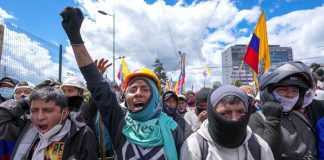WITH THE Pentagon finally admitting that the occupation of Afghanistan is in crisis, Pakistan has once again been thrown into the centre of the the “war on terror”.
On June 11, the latest in a series of US bombing raids on the Pakistan-Afghanistan borders hit a Pakistani military outpost, killing 11 soldiers.
This is just one more headache for President Pervez Musharraf and the new Pakistani government, elected in late February. The victorious parties in the election—the Pakistan Peoples Party (PPP) of the late Benazir Bhutto and the wing of the Pakistan Muslim League that supports Nawaz Sharif (PML-N)—won votes on the back of anti-Musharraf sentiment and opposition to the war. The PML-N went so far as suggesting impeaching Musharraf during the campaign.
But now they too are in charge of trying to manage the disastrous, creeping war on their western border and growing popular unrest over judicial independence and food shortages.
War in Afghanistan spreads
The Bush administration has backed the presidency of Musharraf (which came after his coup in 1999) to the hilt on the condition that he cooperate with operations in Afghanistan. The war is deeply unpopular within Pakistan, with many seeing it as a war on Muslims.
As fighting within Afghanistan has intensified, seeing more Coalition deaths per month now than Iraq, the long-fraught question of the Pakistan border has once again become a hot topic. In early June, Afghanistan’s president Hamid Karzai threatened to send troops across the border to attack militants inside Pakistan.
Around the same time, The New York Times exposed Operation Cannonball, a plan formulated by the Pentagon to make it easier for the Pentagon’s Special Operations to conduct missions inside Pakistan. It has not been implemented for fear of destabilising Musharraf’s already shaky rule. Rebel fighters within Afghanistan have recently regained control of Khost province on the border with Pakistan. It is a region of great significance, where victory against the Russian occupation in the 1980s cemented their final defeat.
The Bush administration has been putting immense pressure on the Pakistani government to attack rebel forces in Pakistan’s north. The idea was that Pakistani forces could attack them from the south and US forces from the north.
This was always going to be a dangerous proposition, given that the tribes in the north of Pakistan have enjoyed a degree of autonomy since a 2006 ceasefire, secured when they forced Pakistani soldiers to withdraw from the region as far as Peshawar.
Growing social movements
The government also faces the continuing democracy movement and a deteriorating economy.
The movement to reinstate the lawyers Musharraf sacked in November 2007—as well as the chief justice of the Supreme Court, Iftikhar Chaudhry, sacked in March 2007—continues. In June activists took the “long march” to Islamabad, during which thousands of lawyers and democracy activists protested across the country.
Inflation is at a 13 year high, and the World Bank has added Pakistan to a list of countries that could face political instability because of rising food prices. Riots and protests over the cost of food have erupted through the first half of this year. There are acute shortages of flour and drinking water.
Pakistan’s organised workers’ movement, including struggles against privatisation, revived to some extent with the democracy movement in July last year. Textile workers are engaged in a struggle for higher wages, with a 10,000 strong militant picket in Faisalabad recently. Students are taking action in the lawyers’ protests.
The immediate outlook
The pressures on the government are not going anywhere soon. The likely next US president, Barack Obama, is fully committed to continuing and even escalating the war in Afghanistan.
He understands the implications for Pakistan, saying, “If we have actionable intelligence about high-value terrorist targets and President Musharraf won’t act, we will.”
Kevin Rudd champions the war in Afghanistan and is attempting to solicit more troops from participating governments. With defeat staring them in the face, there is a lot at stake for the Coalition’s armed forces.
Despite their moments of left-talk, both the PPP and the PLM-N have shown no sign of planning for a real break with either Musharraf or the forces of US imperialism in the region.
It is the struggles for democratic rights and food security that could lay the basis for real change in Pakistan. Linking the struggles against imperialism with these grassroots movements could be an explosive mix.
By Ernest Price





